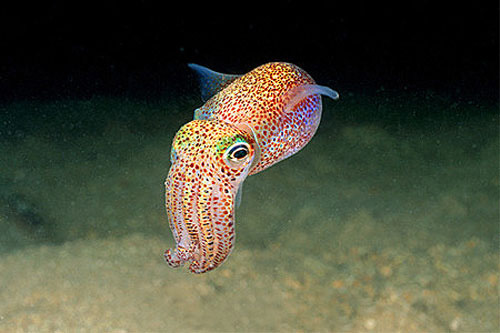
Amphioctopus marginatus, also known as the "coconut octopus" or "veined octopus",
is a medium-sized cephalopod belonging to the genus Amphioctopus. It is found in
tropical waters of the western Pacific Ocean. It commonly preys upon shrimp, crabs,
and clams, and displays unusual behaviour, including bipedal walking and gathering
and using coconut shells and seashells for shelter. Source: Wikipedia
The main body of the octopus is typically around 8 centimeters (3 in) in size, and, with
arms, approximately 15 centimeters (6 in) long. In this amazing capture by photographer
Mario Neumann, the contrast of the white suckers to the rest of the octopus and sea
floor makes it look like some kind of alien spaceship.


